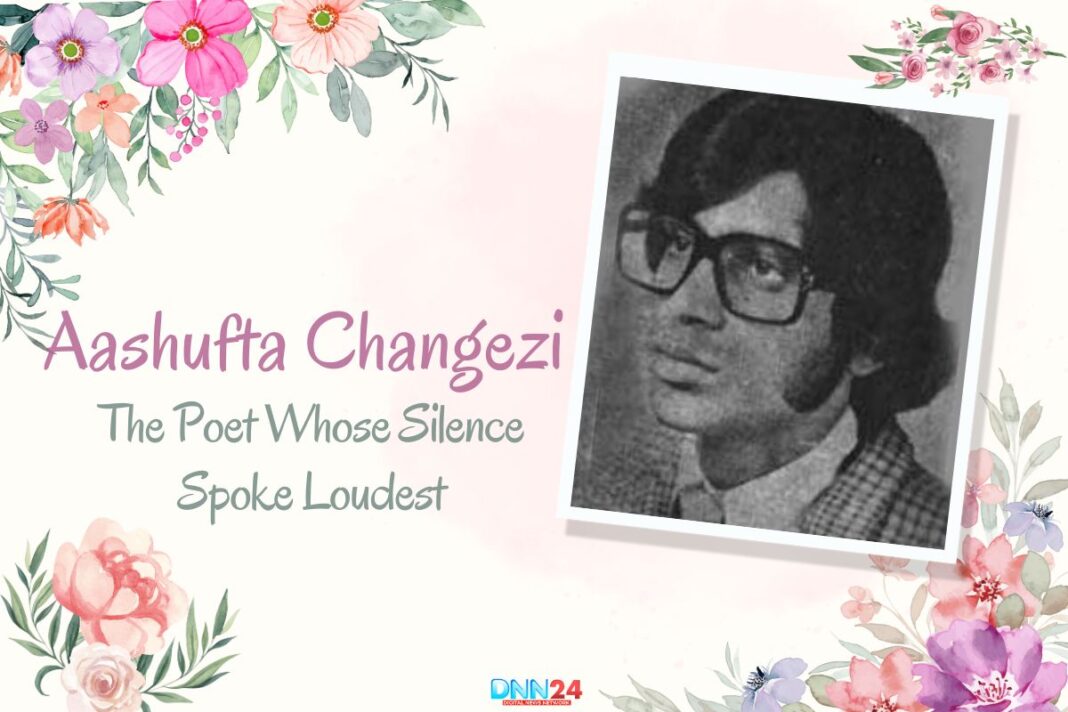Aashufta Changezi, born in 1956 in Aligarh, India, was never a man of noise or spotlight, but his life was a tapestry woven with deep emotions and unheard stories. The smells of aged books filled the air in Aligarh, where he spent his youth, and the evening call to prayers could be heard. People noticed he was odd at a young age—tranquil, very watchful, and frequently in his faded diary.
Unchi udaan ke liye par taulte the hum
Aashufta Changezi
Unchayon pe saans ghutegi pata na tha
The writer’s family was not complicated, nor were his dreams—to write, feel, and grasp the world’s joys and sorrows. He was more than just a poet; he was always wandering the city, listening to the experiences of rickshaw drivers, people serving tea, and widows by themselves. People often noticed that he sat by the roadside daydreaming, and his eyes seemed to hold a thousand secrets.
Hamein bhi aaj hi karna tha intezaar us ka
Aashufta Changezi
use bhi aaj hi sab vaade bhool jaane the
She went through many hardships in life. He went through a lot—living in poverty, being lonely, and finding it tough to be recognized by those who tend to ignore quiet voices. Nevertheless, he never gave in to complaining. He put his pain and dreams into his writing, so every hurt turned into a poem, and every tear became a song.
Khwab jitne dekhne hain aaj saare dekh lein
Aashufta Changezi
Kya bharosa kal kahaan pagal hawa le jaayegi
His life was like an old ghazal, marked by wanting, suffering, and lasting hope that wouldn’t go away. He had a simple life, yet his heart was big enough to share in all the feelings of the people around him. In every silent moment and unnoticed gesture, Aashufta Changezi was writing his own story—a story that the world is only now beginning to hear.
Hawaen tez thin ye to faqat bahane the
Aashufta Changezi
safine yun bhi kinare pe kab lagane the
KHayal aata hai rah rah ke lauT jaane ka
safar se pahle hamein apne ghar jalane the
guman tha ki samajh lenge mausamon ka mizaj
khuli jo aankh to zad pe sabhi Thikane the
The Night of Lost Dreams: The Untold Kissee
People in Aligarh still recall an incident that shocks them to this day. A few days later that year, a girl in the neighborhood’s house was saddened by her father’s accident. Everyone was sad, and they did not know how to cheer her up. After discovering the news, Aashufta quietly went home. His actions did not involve giving presents or offering grand commitments.
He decided to sit beside the girl, being there with a gentle touch and staying quiet. Gradually, he got a sheet of paper and started to recite a poem he had written for her alone. It mentioned how stars help us even when the sky is not visible, how memories keep us strong, and how love sticks with us through every moment. What he said moved everyone profoundly, and tears filled their eyes.
Kis ki talaash hai hamein kis ke asar mein hain
Aashufta Changezi
jab se chale hain ghar se musalsal safar mein hain
After not saying anything for many months, the girl raised her head and smiled gently. That night, Aashufta supported the child and provided hope to everyone in the family. Local people soon heard of the amazing kissee, and the story has been handed down through the generations. It was not only about poetry but also about how kindness can heal a person when delivered through a few kind words. There were many such moments in Aashufta’s life, and they stayed etched in the hearts of those who received them.
Guzar gae hain jo mausam kabhi na aaenge
Aashufta Changezi
tamam dariya kisi roz Dub jaenge
safar to pahle bhi kitne kiye magar is bar
ye lag raha hai ki tujh ko bhi bhul jaenge
alaw ThanDe hain logon ne jagna chhoDa
kahani sath hai lekin kise sunaenge
Poetry speaks for the people who are not heard
Aashufta Changezi’s poetry was like a mirror reflecting the joys and sorrows of ordinary people. His writings included ghazals and nazms that covered each part of human emotion, such as love, grief, a sense of wanting and hope. Although his poems would appear simple, they still expressed profound emotions. He thought that poetry ought to be shared by many, not only written on pages. After dark, he usually sat outside the mosque or in a teashop’s ear, reading his poems to those passing by or willing to stay and listen. His speeches always brought people together—students, shopkeepers, and older men—because his words fascinated them.
Sawaal karti kai aankhein muntazir hain yahaan
Aashufta Changezi
javaab aaj bhi hum soch kar nahin aaye
His poems did not deal with prominent themes or tricky metaphors but with day-to-day life, emotional breakups, kindness among friends, and powerful mothers. One of his most famous lines, “Sawal karti kayi aankhen muntazir hain yahan” (“So many questioning eyes wait here”), became a symbol of the silent struggles faced by countless people. Poems by the poet were sung at weddings, funerals, and festivities, forming part of people’s shared memories. Many people still love and respect Mirza Ghalib simply by repeating his Shayari today. Anyone who has experienced loneliness, unnoticedness, or feeling uncared for could relate to Aashufta’s poetry.
Sabhi ko apna samajhta hun kya hua hai mujhe
Aashufta Changezi
bichhaD ke tujh se ajab rog lag gaya hai mujhe
jo muD ke dekha to ho jaega badan patthar
kahaniyon mein suna tha so bhogna hai mujhe
main tujh ko bhul na paya yahi ghanimat hai
yahan to is ka bhi imkan lag raha hai mujhe
His Disappearance and the Power of His Influence
In 1996, Aashufta Changezi disappeared mysteriously, leaving only his poems and memories behind. His disappearance surprised everyone in the area. Some claim he set off to find peace, and others think he just drifted away, feeling lonely and misunderstood. When he disappeared, it became another mysterious part of the story about the silent poet. Even after he vanished, his impact became even stronger. Today, his poetry is recognized throughout India, especially in Aligarh; people remember him as a poet who gave a voice to the voiceless.
Tujh se bichhadna koi naya haadsa nahin
Aashufta Changezi
aise hazaron qisse hamari khabar mein hain
Every day, new hearts experience Waheed’s verses in school, during poetry readings, and on social networks. Aashufta showed the world that real greatness comes from feeling emotion and putting others before oneself. Even though he suffered a lot, his experience became a sign that even those who seemed unnoticed could still have a substantial impact. In every poem and act of kindness, Aashufta Changezi lives on, inspiring new generations to listen, feel, and dream.
Bura mat man itna hausla achchha nahin lagta
Aashufta Changezi
ye uThte baiThte zikr-e-wafa achchha nahin lagta
jahan le jaana hai le jae aa kar ek phere mein
ki har dam ka taqaza-e-hawa achchha nahin lagta
samajh mein kuchh nahin aata samundar jab bulata hai
kisi sahil ka koi mashwara achchha nahin lagta
Also Read: Nazeer Akbarabadi: India’s Forgotten Voice of Festivity, Faith, and Resistance
You can connect with DNN24 on Facebook, Twitter, and Instagram and subscribe to our YouTube channel.



